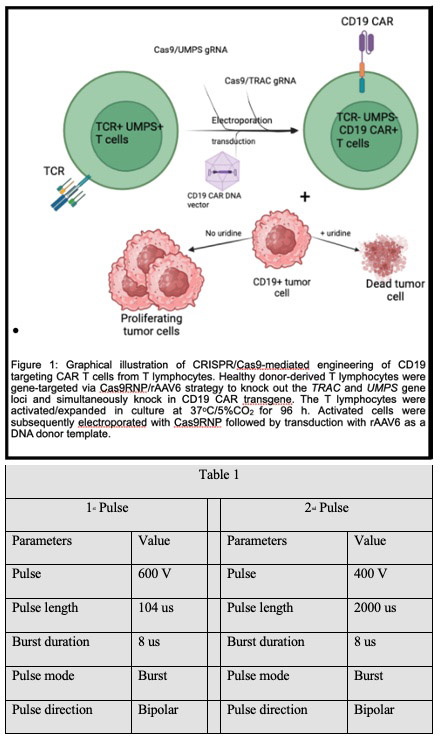Chimeric antigen receptor (CAR)-expressing T cells have revolutionized immunotherapy of cancer. However, some patients derive no benefit from approved CARTcell therapies due to limitations such as toxicity and use of autologous cells which are sometimes unfit and risk manufacturing failures. Additional or more effective CARTcell therapies are needed. Harnessing the endogenous homology-directed DNA repair pathway via precision genome editing based on Cas9RNP/rAAV6, we and others have demonstrated the feasibility of targeting transgene(s) integration into specific gene site(s) including their incorporation under endogenous regulatory elements. Using this strategy, we aimed to engineer healthy donor-derived CAR T cells from αβ+ T lymphocytes. For enhanced safety, we metabolically reprogrammed the CAR T cells by inactivating the UMPS gene needed for uridine biosynthesis. The UMPS-/-CAR T cells become dependent on exogenous uridine thereby serving as a cell control mechanism. We hypothesized that donor-derived αβ+ T lymphocytes can be engineered using the Cas9RNP-rAAV6 strategy in an automated closed-system into controllable CAR T cells.
We inactivated TRAC and UMPS gene loci in αβ+T lymphocytes using Lonza4D nucleofector. Electroporated cells were simultaneously transduced with CD19CAR-containing rAAV6 DNA vector. We obtained TRAC gene knockout up to 97% with knock-in up to 89%. Disruption of the UMPS gene would transform the cells to being auxotrophic and depend on uridine supply for viability and growth. To evaluate the CART cells' antitumor potency, we cocultured the CD19CART cells with GFP-expressing Nalm6 leukemia cell lines. The CD19CART cells eradicated the leukemia cells within 72 hours. To mimic relapse, we re-challenged cocultured CART with Nalm6 cells and the tumor cells were again depleted within 72 hours. Expectedly, IL-2 production was elevated in CD19CART cells challenged with Nalm6. Next, we tested the ability to control the cytotoxicity of the CD19CART cells by coculturing them with Nalm6 cells in separate groups with/without exogenous uridine. Interestingly, the CD19CART cells cocultured without uridine eradicated the target cells within 72 hours but lost their potency upon subsequent challenge (Figure 1). In contrast, CD19CAR T cells supplied with uridine remained potent and repeatedly eradicated target cells indicating the ability to turn off the potency of CART cells with uridine supply/withdrawal. To establish an automated closed-system for CART cells, we adopted the Miltenyi CliniMACS Prodigy with in-line electroporator (Elpo) for process engineering. First, we determined optimized parameters for electroporating αβ+ T lymphocytes on Elpo(Table1). Cells electroporated with these settings were (>80% viability) comparable to untreated cells. We first engineered CART cells with Elpo/Miltenyi reagents in an open system(i.e.cultivated Elpo-electroporated cells in culture vessels/incubators). We obtained 95% of TRAC and UMPS gene knockouts and up to 90% CD19CAR transgene knock-in to the TRAC locus - an efficiency slightly higher than using Lonza 4D nucleofector. To scale up the Cas9-based T cell engineering into a single automated process on the CliniMACS Prodigy, the Cas9 and guide RNA reagents would be scaled up 1000fold. To make the process cost-effective, we tested AZD7468, a small molecule DNAPKcs inhibitor. We optimized/reduced the amounts of reagents upto 90% less of Cas9RNP used without any significant reduction in gene editing outcomes. AZD7648 reduced the MOI needed for viral transduction by 50% while maintaining 80% or higher levels of transgene knock-in efficiency. Next, we commenced pilot studies to automate the CAR T cell engineering process in closed-system. Currently, we have achieved an automated TRAC gene knockout of over 90% and CAR transgene knock-in of slightly >10%. Further optimization studies are underway to improve automated gene knock-in efficiency.
We have engineered donor-derived αβ+ T lymphocytes into potent/controllable CD19CART cells. The UMPS-deficient CD19CART cells lose antileukemia activity without uridine. We show that metabolic reprogramming can be combined with precision genome editing to generate controllable CART cells. Finally, our data demonstrate the feasibility of automating CRISPR/Cas9-mediated engineering of CAR T cells within closed-system.
Disclosures
Porteus:CRISPR Tx: Current equity holder in publicly-traded company; Graphite Biologics: Current equity holder in publicly-traded company, Membership on an entity's Board of Directors or advisory committees; Allogene Therapeutics: Current equity holder in publicly-traded company, Membership on an entity's Board of Directors or advisory committees; Alaunos Therapeutics: Current equity holder in publicly-traded company, Membership on an entity's Board of Directors or advisory committees; Kamau Therapeutics: Current equity holder in private company.


This feature is available to Subscribers Only
Sign In or Create an Account Close Modal